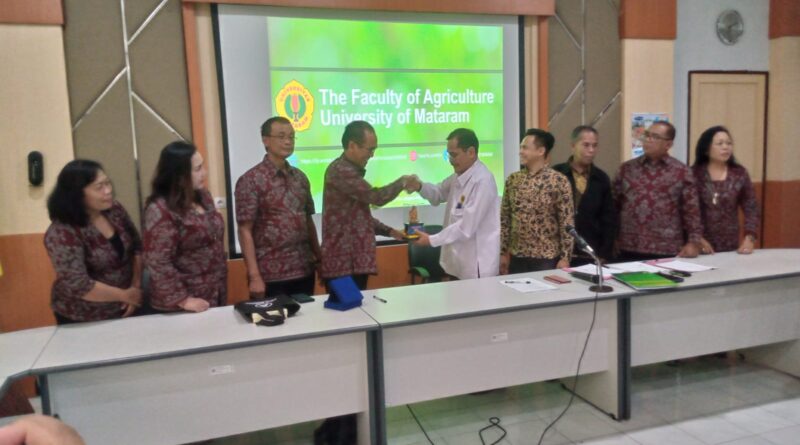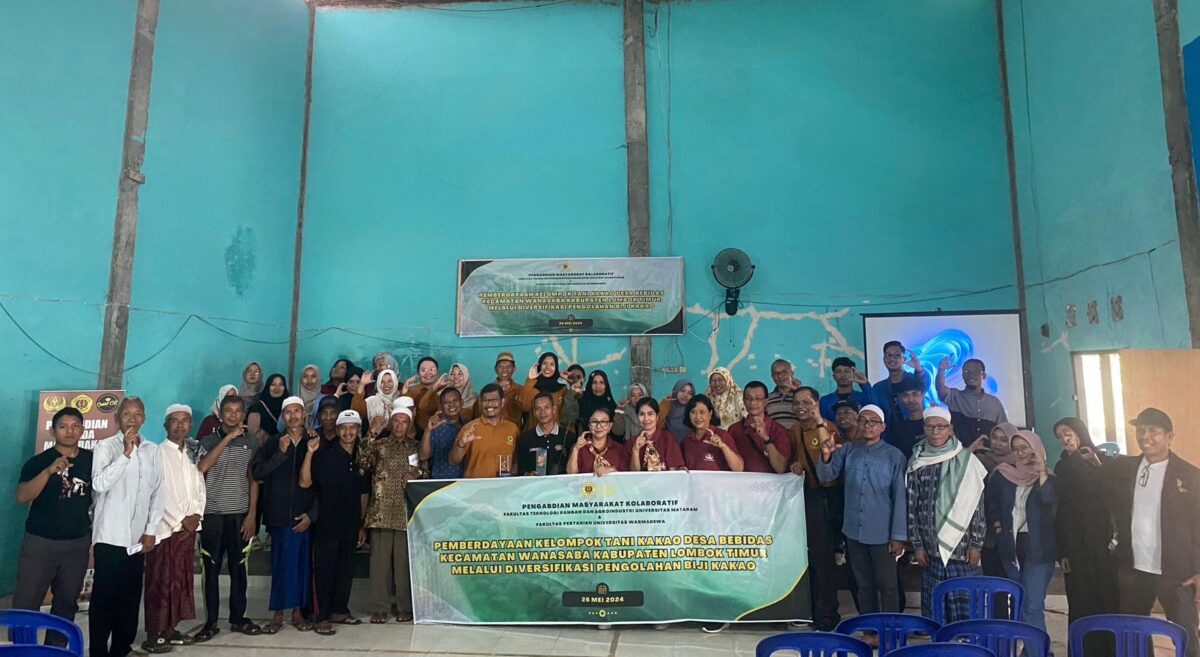By: I Nengah Muliarta (Academician of Agrotechnology Study Programme Faculty of Agriculture-Universitas Warmadewa)

The term tenget in Balinese means haunted or dangerous so you must be vigilant and careful to behave in places that are said to be tenget. Tenget is sometimes identified as a sacred place or sacredised by the local community. So the use of the term tenget implies a prohibition against careless behavior, and disturbing damage to the area, environment, place, buildings, and even plants. The term “tenget” has significant cultural and spiritual meaning for the Balinese people.
In Balinese society, “tenget” refers to places or objects that are believed to contain supernatural or mystical energy. These locations are often considered scary or haunted due to the presence of unseen entities or spirits. The concept of “tenget” is deeply rooted in Balinese beliefs and traditions, shaping their interactions with the spiritual world and influencing various aspects of daily life.
For the Balinese, “tenget” symbolizes a connection with the spiritual realm and serves as a reminder of the presence of supernatural forces around them. It reflects a deep respect for the supernatural world and a belief in the existence of sacred energies that inhabit certain places or objects. The notion of “tenget” influences religious practices, rituals, and social customs, guiding individuals in their interactions with the spiritual dimension of reality.
Generally, locations designated as “tenget” are treated with great respect and care, as they are thought to be inhabited by mystical beings or ancestral spirits. People may pray, make offerings, or perform ceremonies at these places to appease unseen forces and seek protection from negative influences. The presence of “tenget” elements in Balinese culture underscores the importance of maintaining harmony between the physical and spiritual realms, fostering a deep sense of connection with the supernatural world.
Overall, “tenget” has multiple meanings for Balinese people, encompassing notions of spirituality, tradition, and cultural identity. Tenget serves as a symbol of respect for the mystical aspects of existence and reinforces the belief in the connectedness of all living beings to the spiritual forces that shape their lives. Through the practices associated with “tenget,” Balinese people uphold their customs and honor their heritage while navigating the complexities of modern life in a rapidly changing world. Tenget is a traditional concept or practice that aims to maintain the balance and sustainability of nature in a particular area. Tenget is usually applied in areas that are considered to have spiritual or sacred value, such as forests, rivers, mountains, or other places that are considered to have supernatural powers. The local community believes that these areas must be maintained and respected to prevent unwanted things from happening.
One form of tenget implementation is to limit human activities in the area, such as prohibiting tree cutting, animal hunting, or other activities that can disturb the balance of nature. People also usually perform certain rituals to ask for permission and protection from supernatural forces believed to control the area. In addition, tenget can also function as a sustainable natural resource management system. By preserving nature, the community can ensure that natural resources in the area remain available for future generations.
Overall, tenget is a form of local wisdom that is very important in maintaining the balance and sustainability of nature in an area. This practice reflects the local community’s understanding of the importance of maintaining a harmonious relationship between humans and nature.
Tenget places, which are considered sacred and have strong spiritual energy, are generally also seen as part of the natural environment that must be maintained and preserved. Through the concept of tenget, Balinese people view nature as something sacred and should be treated with respect. This encourages them to preserve the environment, including tenget places, as part of an effort to maintain the balance of life wrapped in the concept of Tri Hita Karana.
A Balinese philosophy of life that teaches about the harmonious relationship between humans and fellow humans, humans and nature, and humans and God. Tenget itself means harmony or balance that must be maintained to create harmony in everyday life. In the context of nature conservation and disaster mitigation, the concept of tenget emphasizes the importance of maintaining a balance between human activities and natural ecosystems and paying attention to spiritual aspects in environmental management.
The term tenget, when viewed scientifically in the concept of the human relationship with God, can be associated with the concept of spirituality and human transcendental experience. can be associated with the concept of spirituality and human transcendental experience. In general, “tenget” refers to a condition or experience in which a person feels connected to something greater than himself, such as God, the forces of nature, or spiritual reality.
From the perspective of psychology and neuroscience, the “tenget” experience can be explained as brain activity related to the central nervous system. When a person has a spiritual or transcendental experience, there is increased activity in areas of the brain involved in emotions, memory, and self-perception. This can result in feelings of calmness, happiness, and a sense of connection to something greater. In addition, the concept of “tenget” can also be linked to theories of transpersonal psychology, which studies the spiritual dimension and peak human experiences. In this perspective, “tenget” can be viewed as an experience in which a person transcends the boundaries of the ego and reaches a broader consciousness, allowing them to feel the presence of God or spiritual forces. Efforts to conserve “tenget” areas can be seen as a form of safeguarding and honoring the spiritual and sacred values contained therein.
Human relations are one of the important pillars for achieving harmony and prosperity. The term “tenget” in this context can be understood as a shared awareness between human beings to jointly protect and not take actions that can damage areas that are said to be haunted or tenget. The concept of “tenget” in human relations reflects a strong sense of understanding, empathy and belonging. When people have the same perception of the “tenget” area, they tend to have a shared understanding of the importance of maintaining and preserving the natural environment around them. A strong sense of belonging to natural areas considered “tenget” will encourage more effective conservation and protection efforts.
The concept of “tenget” also implies balance and tranquillity, both in human relations and in human-nature relations. When there is balance and tranquillity in social interactions, it will support conservation efforts of natural areas that are considered “tenget”. People who live in “tenget” conditions tend to be wiser and more careful in utilizing natural resources, to preserve the environment. The concept of “tenget” in Tri Hita Karana is often related to the local wisdom and traditions of the local community.
Conservation efforts in areas claimed to be “tenget” are often based on cultural values and traditions that have been passed down from generation to generation. Understanding and appreciation of the concept of “tenget” can be the basis for communities to conserve natural areas that are considered sacred or holy. The harmony, sense of belonging, balance, and local wisdom contained in the concept of “tenget” can support and strengthen community initiatives to preserve the natural environment around them.
When viewed in terms of a modern scientific perspective, the term “tenget” is no longer associated with supernatural forces, but rather with geographical, geological, and meteorological factors that make an area vulnerable to natural disasters. Areas prone to natural disasters usually have certain characteristics, such as being near active faults, mountain slopes, or areas with high rainfall, which make them prone to disasters. Thus, the term “tenget” about natural disaster-prone areas is a reflection of the community’s traditional understanding that has evolved into a modern scientific understanding of the factors that cause natural disasters in an area.
The concept of tenget also plays an important role in disaster mitigation efforts in Bali. By maintaining a balance between human activities and nature, it can reduce the risk of natural disasters such as floods, landslides, or soil erosion. In addition, the spiritual aspect of the tenget concept also provides an understanding that humans as part of nature must live in a balanced and sustainable manner to avoid adverse impacts on the environment.
In the context of disaster mitigation, tenget can be interpreted as vigilance or caution that must be owned by the community in the face of potential disasters. The meaning of tenget is very relevant in disaster mitigation efforts because, with vigilance and caution, the community can be more prepared and responsive in facing disaster threats such as earthquakes.
The importance of tenget in disaster mitigation is related to prevention, preparation, and rapid response to emergencies when disasters occur. By having high tenget, people will find it easier to respond to early warnings, follow evacuation procedures properly, and keep themselves and others safe during and after a disaster. The meaning of tenget also includes awareness of the surrounding environment, knowledge of actions to take, and the ability to adapt to emergency conditions. As such, tenget is an integral part of mitigation efforts that aim to minimize disaster risk and protect community safety. Tenget is an important foundation in mitigation measures to protect community safety and minimize the adverse impacts of natural disasters.
Although the concept of tenget has great positive value in maintaining conservation areas and disaster mitigation in Bali, there are still challenges in its implementation. One of the main challenges is modernization which can threaten traditional values such as the concept of tenget. Therefore, education and socialization about the importance of the tenget concept need to be carried out continuously so that its value remains relevant amid the times.
According to Sunarno & Supriatna in an article entitled “Ecological Intelligence in Local Wisdom of the Tengger Tribe as Learning Sources of Social Studies” published in PAEDAGOGIA in 2023, existing local wisdom is important to be passed on to the next generation, but globalization hinders the process of passing on these values. As a form of ecological intelligence, local wisdom can be adopted as a learning resource in schools as a legacy effort.








 Users Today : 1
Users Today : 1 Total Users : 9668
Total Users : 9668 Views Today : 1
Views Today : 1 Total views : 23941
Total views : 23941
0 Komentar